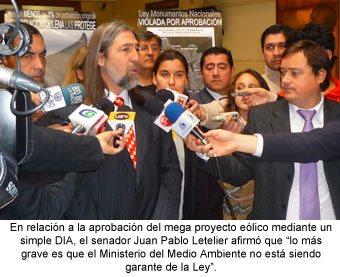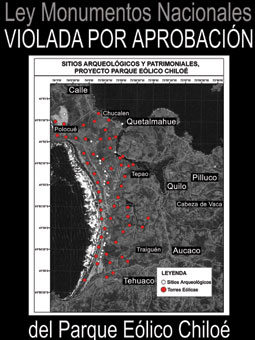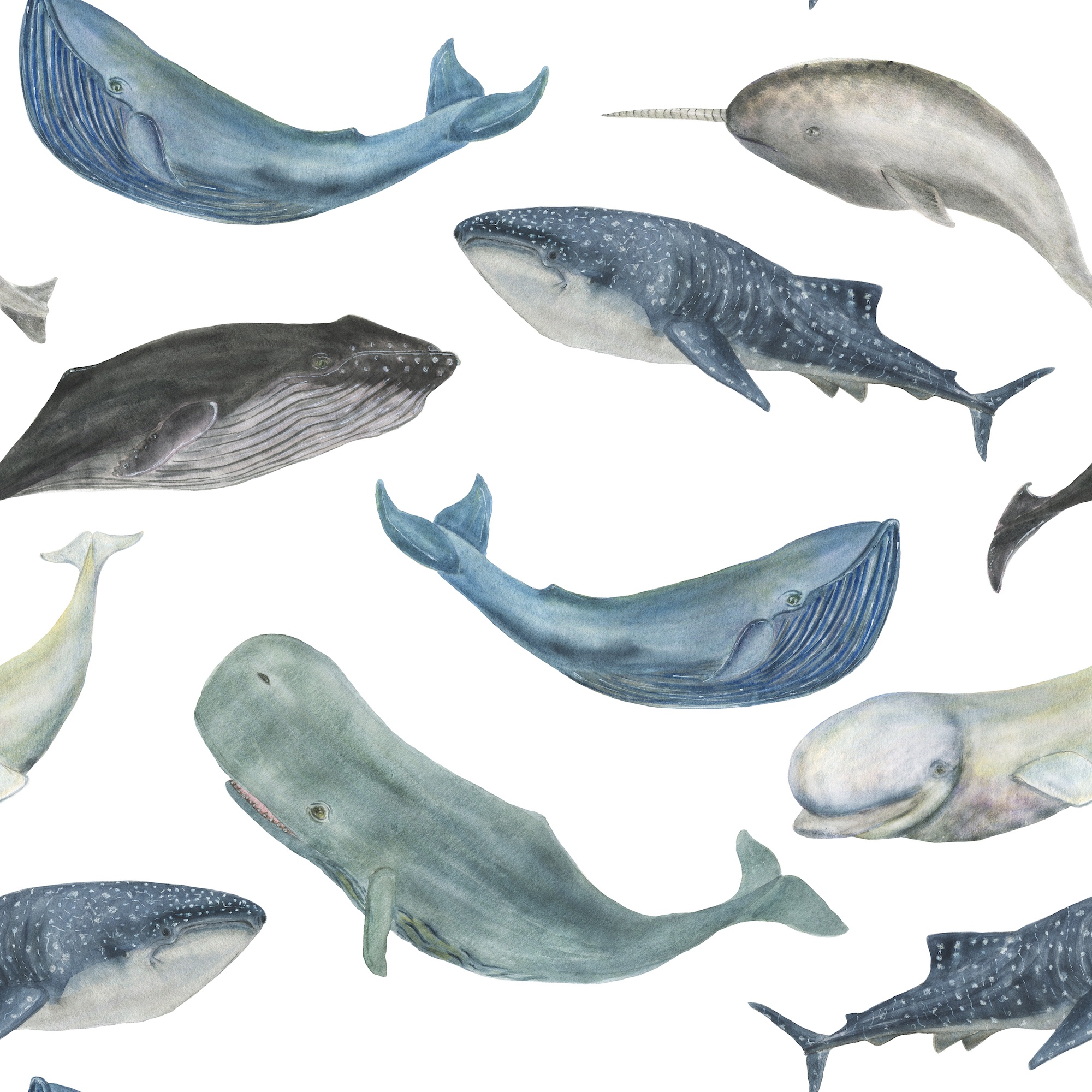Valparaiso, Chile, 17 August 2011 – In response to the concerning irregularities in the approval of the mega wind farm project “Parque Eolico Chiloe” (PEC) by the Environmental Evaluation Committee of Los Lagos region (southern Chile) more than 30 NGOs with the support of senators Juan Pablo Letelier, Alejandro Navarro and deputies Enrique Accorsi and Fidel Espinoza, announced that they will present administrative and legal measures to demand the compliance of the law.
On august 1st the mega wind farm project PEC was approved without the conduction of an Environmental Impact Assessment (EIA) as required by the Chilean law for energetic projects that could potentially affect cultural and/or natural heritage, among others. The Environmental Evaluation Committee of Los Lagos region, presided by mayor Juan Sebastian Montes, pass the project with a simple Environmental Impact Declaration (EID) that that was made by Ecopower, the company directly involved in the development of the project.

According to the vice chair of the Chilean senate, Juan Pablo Letelier, “the environmental institution in our country is sinking. The Framework Law on the Environment requires procedures and processes that are not being fulfilled and today we are denouncing a new case”. Regarding the approval of the mega wind farm project PEC with a simple EID, Letelier added that “”The most serious concern is that the Ministry of Environment is not being a guarantor of the law.”
The deputy of Los Lagos region, Fidel Espinoza, affirmed “the minister of the environment, Maria Ignacia Benitez, lied to the country in a session held yesterday in the congress when she stated that there was no opposition to this project and that is false”. In regard of Non Conventional Renewable Energies, Espinoza highlighted that “we support wind farms but we oppose the form in which the process has been conducted and this is why we will take legal measures”.
During the last year, the controversial approval of diverse mega energetic projects like Hydroaysen, Mining Isla Riesco and Thermoelectric Castilla reveal that the new environmental institution is functional to the imposition of an energetic policy that does not care about major environmental impacts and that does not take into account the participation of the civil society.
In this regard, Ana Stipicic, leader of the conservation movement “Alerta Isla Riesco” affirmed that the irregular approval of the PEC project “is an example of what is happening in Chile that clearly shows that the environmental institution is not working. The substantive issues here are who is running this country? Who are taking these decisions? And who are benefiting from these projects?”
Lucio Cuenca, executive director of the Latin America Observatory of Environmental Conflicts (OLCA) added “we are under an schizophrenic situation in relation to the energetic policy of the country. On one side highly destructive projects are being approved and on the other renewable non-conventional initiatives are being rejected due to poor political decisions”. On the malfunction of the environmental institution, Cuenca said “we can not continue to accept that decisions are in the hands of the companies. We need to move to a new society and create an environmental policy that responds to the rights of the people and an energy policy that is truly committed to renewables as well as the environment”.

Although it would be expected that cherished Non Conventional Renewable Energy projects, as wind farms, would be a solution to reduce the conflicts caused by power generation, the vicious behavior and malfunction of the new environmental institution has generated opposition of local and international communities to the PEC project due to its lack of complyment with the law, its location in highly sensitive areas, its potential impacts on protected species, the destruction of invaluable archeological sites and the menace for the development of tourism in an area with the greatest potential for conducting blue whale watching in the region.
In response to this situation, Juan Alberto Molina, the lawyer representing the plaintiffs that will promptly file a legal motion said “as reaffirmed by the Supreme Court in other cases, when the environmental assessment fails in form or substance, the same environmental institution have the authority to cancel the procedure and restart the process”.
In particular, the possible impacts of the PEC project on the most important population of blue whales in the southern hemisphere made the Scientific Committee of the International Whaling Commission – the leading world body in cetacean research – make a strong recommendation last May calling the government of Chile to conduct an Environmental Impact Assessment and even relocate the project farther away from the coastline. Although in Chile all species of cetaceans are protected by Law 20,293 and all have been declared Natural Monument, the recommendation was completely ignored by the regional authorities that passed the project.
In this regard Barbara Galletti, president of the chilean NGO Centro de Conservacion Cetacea said “it is a pity that a flagship project of non-conventional renewable energy is made trespassing the law. The environmental institutional is simply not working and is sistematically taking similar subterfuges to approve energy projects along the country”.
For these reasons, civil organizations with support from several parlamentarians announced at a press conference held yesterday in the Chilean Congress, tat they will present legal measures to override the resolution that approved the PEC project. Additionally, due to the apparent lack compliance of the environmental institution within the law, the establishment of a Joint Invetigation Committee in the congress will also be requested to address the growing irregularities of the environmental institution in the apporval of energy projects in Chile.




